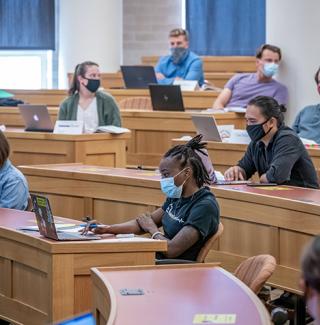MFJS Makes Essential Contributions to the COVID Planning Process
By Ana Ortega, junior journalism major
DU has made large strides to get their students back on campus after the global pandemic shook the nation. This has meant putting hours into COVID planning committees to ensure the university is able to remain active during the pandemic. Keeping the best interests of their students and faculty in mind, administrators have created and recreated a COVID planning process in order to reap the best results.
The MFJS department is proud to be represented by two professors who have been contributing to the COVID planning committee. Associate Professors Derigan Silver and Renee Botta have been actively involved in the COVID planning process to ensure the safe return of staff, students and faculty.
Both Silver and Botta were asked to be part of the Fall Logistics Task Force in March 2020 when it became apparent that universities worldwide would have to coordinate plans to bring students back on campus safely. Silver served as one of the leaders in the committee and later stepped in as the Interim Deputy COVID Coordinator. He landed a permanent role as the COVID coordinator in November, where he now helps with various aspects of the DU COVID response.
“Specifically, we looked at teaching modalities, classroom support, student support, faculty support and performance class/labs,'' Silver said. The strategy was successful and students were able to safely return to campus for in-person learning while keeping the number of COVID cases low. Silver emphasized that there have been zero cases of classroom transmission at DU.
The committee’s efforts have led to a huge capacity for nasal testing on campus and DU innovators have created a unique saliva testing system that has been implemented to great effect. Currently, Silver's main concern is “long haul symptoms” as well as “equitable distribution of vaccines.” Silver said he believes DU is going to come out of the pandemic very strong and with a newfound appreciation for in-person learning.
According to Silver, the strength of DU’s strategy lay in “look[ing] inward for experts." Faculty have been able to grow and learn new skills through their participation in the committee. They found the means to run a biomedical research study while also testing more than 1,200 individuals a day.
Overall, the MFJS department’s contributions to the COVID planning process has aided the university’s success in remaining active during the pandemic. “Without a plan that can be adapted and adjusted on the fly,” Silver said, the Denver area would have lost even more people. DU’s COVID committee is doing what, a year ago, no one was sure would be possible: keeping the community safe while allowing access to high quality in-person and online education during a global pandemic.



